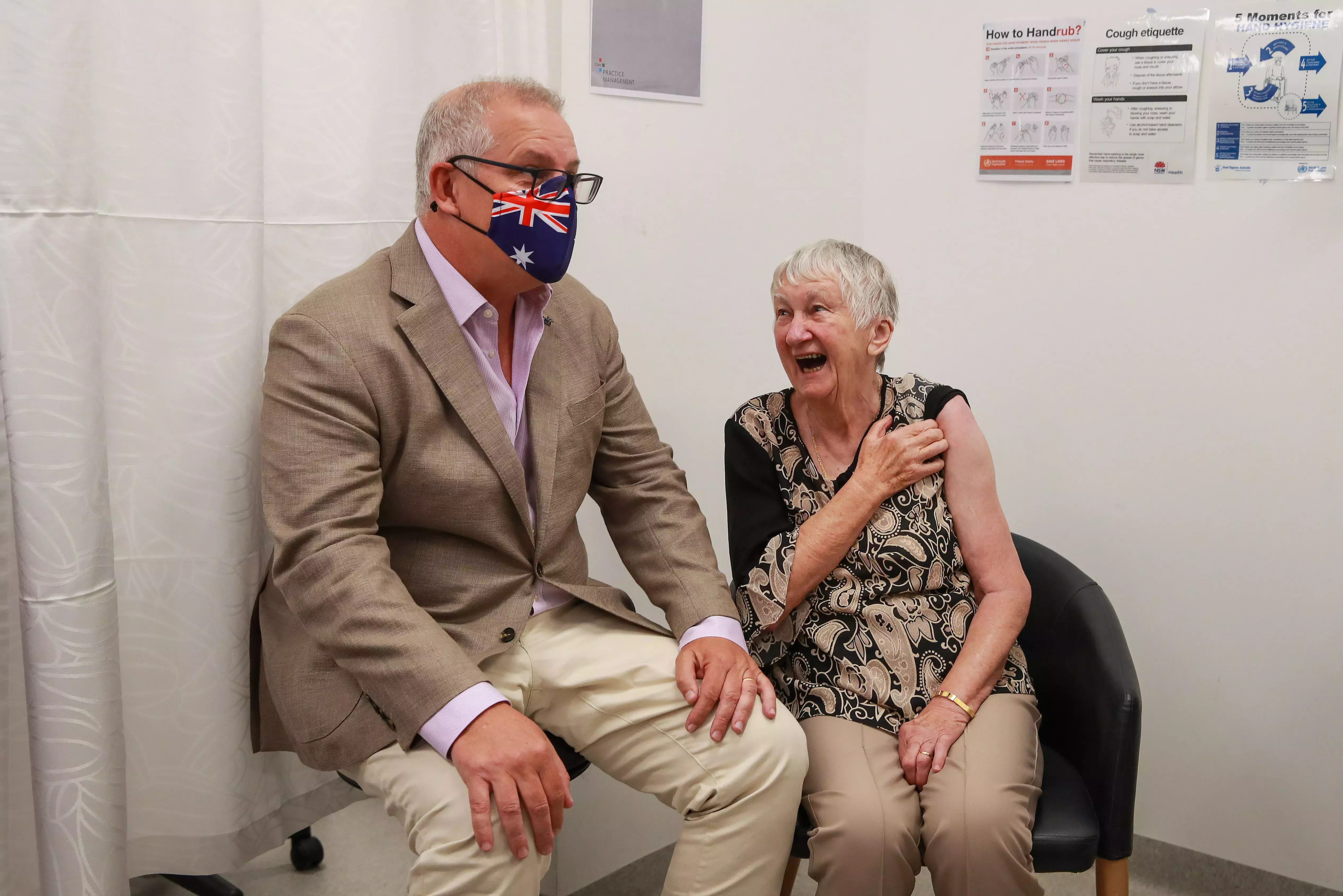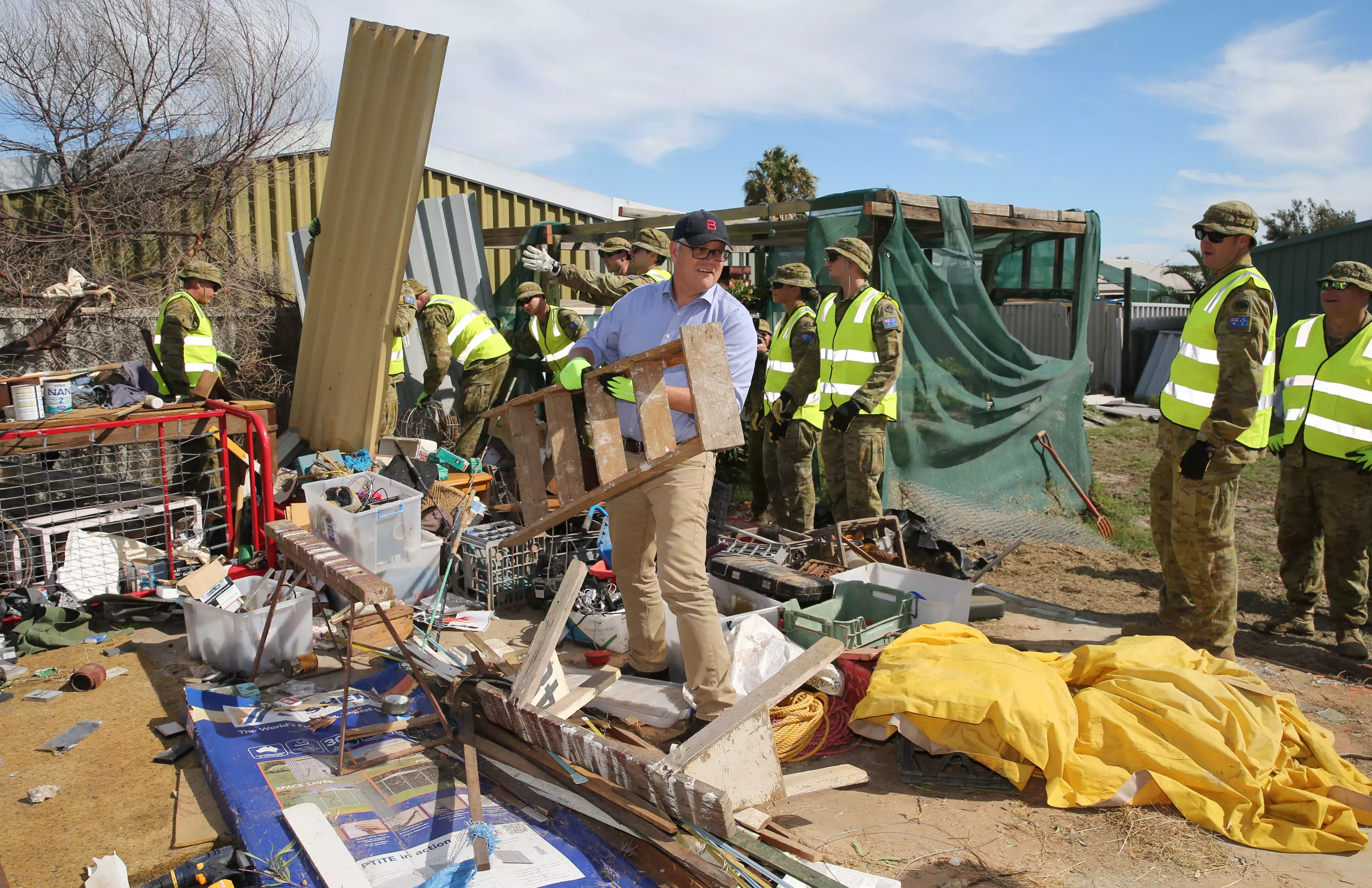SCOTT MORRISON
Scott Morrison became Australia’s 30th Prime Minister when he was elected as Leader by the Parliamentary Liberal Party following the resignation of Malcolm Turnbull.
13 May 1968
Sydney, New South Wales
Jenny Morrison
Liberal
Photo: Alex Ellinghausen/Fairfax
About
Throughout his time as prime minister, Scott Morrison has cultivated the identity of an ‘ordinary Aussie bloke’, reflected in his adoption of the nickname ‘ScoMo’, and an earnest desire to govern in what he considers to be Australia’s national interest.

Photo: Justin Lloyd/Newspix
The Morrison family passions included sport, community service, local politics, church and amateur theatre. A church musical part led to Morrison becoming a child actor in television advertisements. His father John was a police officer and mayor of Waverley and, with his mother Marion, were active members of the community church. As Australia’s first Pentecostal prime minister, religion continues to be an important aspect of Morrison’s life.
Morrison was educated at Sydney Boys High and later the University of New South Wales. He worked for the Property Council of Australia before moving to the Australian Tourism Task Force and later to the rival Tourism Council. In 1998, Morrison headed New Zealand’s Office of Tourism and Sport.
He returned to Sydney and became state director of the NSW Liberal Party from 2000 to 2004. He left to run Tourism Australia and became known for the ‘Where the bloody hell are you?’ advertising campaign to promote Australia to international visitors.
His marketing background has influenced the rhetorical style of his prime ministership as he has been known to exclaim, ‘How good is Australia! How good are Australians!’ as well as producing many visual accompaniments to his campaign trails and media releases. Morrison won the federal seat of Cook in 2007 after the retirement of Bruce Baird. Morrison was Minister for Immigration and Border Protection in 2013 and, after a reshuffle, became Minister for Social Services in 2014.
Before becoming prime minister, Morrison served as federal Treasurer in the Turnbull Government where he is remembered for reducing the deficit and theatrically bringing a piece of coal into parliament to demonstrate the importance of the mining industry in Australia.
MILESTONES
Asia Pacific Economic Cooperation forum
On 17 – 18 November 2018 Prime Minister Scott Morrison attended the APEC forum held for the first time in Papua New Guinea.
National Drought Summit
On 26 October 2018 representatives from farming, agribusiness, governmental, banking and finance and community organisations came together to develop a shared understanding of the impact of the drought and the action to take.
National Apology to victims of institutional child sexual abuse
On 22 October 2018 Prime Minister Scott Morrison delivered the national apology in parliament to the thousands of Australians who were victims of child sexual abuse perpetrated by people in the institutions entrusted with their care.
Biosecurity Act deployed against COVID-19 pandemic
On 21 January 2020, the 2015 Biosecurity Act is deployed for the first time to give government the power to make orders for individuals to isolate in medical facilities or their home to prevent the entry and spread of disease.
Bushfire Royal Commission
In February 2020 Morrison establishes a National Royal Commission into the Black Summer 2019/2020 bushfires.
Creation of the National Cabinet
On 13 March 2020 National Cabinet, an intergovernmental decision-making forum comprised of the prime minister, state and territory premiers and chief ministers, is established in response to the COVID-19 pandemic. It later replaces the Council of Australian Governments.
Australia’s borders closed
On 20 March 2020 Australia closes its borders to all non-citizens and non-residents in response to the COVID-19 pandemic.
Post-pandemic budget
In May 2021 Morrison’s Treasurer Josh Frydenberg delivered a ‘post-pandemic recovery budget’ that affirmed the Party’s commitment to economic growth and social spending in areas including aged care. A ‘gas-fired recovery’ was also announced, with Morrison allocating $58.6m for a new power plant in the Hunter Valley.
Closure of Australian embassy in Afghanistan
On 24 May 2020 Australia closes its Embassy in Afghanistan over security concerns. Two months later the Taliban formed the government of the country ending a more than 20 year conflict that has been Australia’s longest military involvement.
Glasgow Climate Change Conference
In November 2021 the Morrison government committed Australia to a plan to achieve net-zero emissions by 2050. Positioned as a ‘practical way’ to achieve this goal, the plan emphasizes ‘technology not taxes’ and emphasises reducing the relative cost of low emissions technologies to increase uptake of them.
Historic trade deal with India
On 2 April 2022, Australia signed an Economic Cooperation and Trade Agreement with India.
The agreement is expected to create trade opportunities for Australian producers and service providers valued at up to $14.8 billion each year.
360° VIEW
Parliament
The Morrison government was required to negotiate with a growing and increasingly complicated crossbench of seven members in the House of Representatives up until the May 2019 federal election. Morrison’s election victory defied the predictions of major national opinion polls and was an outcome he referred to as a ‘miracle’ brought about by the ‘quiet Australians’. Morrison was lauded in the new headlines as the ‘Messiah from the Shire.’ The Coalition gained an additional seat, obtaining a majority and 77 of the 151 seats in the House of Representatives, while Labor lost one seat.
While Morrison's response to the 2019-2020 bushfires was criticised by some for being passive and delayed, he committed to creating a new law to allow the federal government to declare a national state of emergency in the event of future national disasters. A second crisis emerged with the arrival of the COVID-19 pandemic in January 2020 as parliament suspended all sittings for five months between March and August 2020 and deferred authority to the new National Cabinet.
The adjournment of parliament was met with some concern for its potential to disrupt parliamentary process and oversight, with limited sittings scheduled to pass major economic stimulus packages. The Morrison government followed health advice from Chief Medical Office Brendan Murphy to close Australia's border, introduce international travel bans, enforce all returned travellers to undertake 14-day hotel quarantine and lock down all non-essential services.
As the borders gradually reopened and the federal election loomed in May 2022, the Morrison government drew attention to its political achievements including the $17.7 billion aged care package in response to the Royal Commission into Aged Care Quality and Safety, the trilateral AUKUS security partnership with the United States and United Kingdom and the continuation of the National Cabinet to replace COAG as a more effective forum for Federal-State relations.
After the election defeat it emerged that Scott Morrison, while prime minister, had secretly appointed himself to five ministerial positions between March 2020 and May 2021, despite there being an incumbent minister in each portfolio. His failure to disclose these appointments to the parliament and public resulted in a censure motion in the House of Representatives on 30 November 2022. Morrison is the first non-sitting prime minister to be censured.

Photo: Justin Benson-Cooper/Getty

